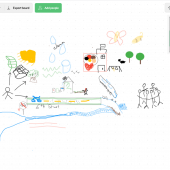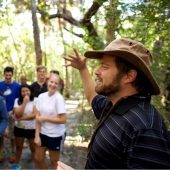
How do we help students (and ourselves as instructors) prepare to engage in sustained action in the face of climate change and its root causes of extraction, inequity, racism and colonialism? In this article, we elaborate on the conceptual and practical challenges in preparing students for sustained action to imagine and enact a compassionate and sustainable future in the face of climate change. We discuss our integrated teaching-research-engagement approach aimed at examining the potential role of compassion as a transformative practice for reducing long-term risks from natural hazards and climate change. We provide summaries of and reflections on a pair of courses taught in 2019 and 2020 that explored, respectively the inner personal dimensions and external relational dimensions of professional work to reduce climate risks. We conclude by detailing some of the lessons we’ve learned in the processes of convening these courses and look to future opportunities for growth and sustained action as educators ourselves.
Continue Reading
In this paper, I draw from the fields of curriculum studies and the environmental humanities to address the sustainability issues associated with the Anthropocene and to theorize what it means to reinhabit our unique bioregions. I argue that it is time to transgress the fragmented and mono-disciplinary investigations emblematic of the academy by embracing pluralistic ways of knowing and going beyond conventional epistemologies to better understand the cultural forces involved in wicked problems such as climate change. Using autoethnography, I draw from my personal experiences related to higher education for sustainable development while discussing what it means to better appreciate a problem’s intractability and to hold our assumptions open to questioning. Additionally, I make connections to Donna Harraway’s conception of staying with the trouble in the midst of these socio-ecological turbulent times. Accordingly, I theorize what it means to stay with the trouble by learning to “love the questions” inherent to studying sustainability issues while articulating the roles that reflection, storytelling and transdisciplinary scholarship play in (re)envisioning a future that sustains the (more than) human world.
Continue Reading
The use of board games in education is under-utilized. As we come out of this pandemic, and adjust to new directions, education can reinvent itself, and create better learning environments. Games can engage students with different learning styles and inspire individual creativity. Board games represent the missing tool in our toolboxes, and they can replace the traditional lectures with a method that reaches all students. This literature review introduces the background needed to incorporate games into curriculum and to encourage educators to embrace that possibility of engagement. Games have the potential to lead us into action in our communities and find solutions for global climate change issues.
Continue ReadingThe present study examined what undergraduate students thought they knew about climate change, what they actually knew in terms of scientific knowledge, and how these two types of knowledge predicted their pro-environmental intentions and behaviors. We tested these questions using a cross-sectional online survey and data from a subsample of undergraduate student participants who believe in anthropogenic climate change (N = 3,310). Students reported moderate levels of self-assessed knowledge yet objectively lacked an understanding of the causes of climate change. Self-assessed knowledge more strongly predicted pro-environmental intentions and action than actual knowledge. Students’ understanding of the consequences of climate change predicted intentions while understanding the causes and climate science predicted action. Students self-identified a lack of knowledge and a lack of prioritization as barriers to climate change mitigating action. Pedagogical implications are discussed.
Continue Reading